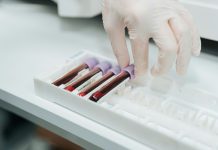
In a new study, researchers found that the microorganisms in our gut could help protect brain cells from damage caused by inflammation after a stroke.
The finding reveals that supplementing the body’s short-chain fatty acids could improve stroke recovery.
The research was conducted by a team from the Ludwig Maximilian University of Munich and elsewhere.
Short-chain fatty acids, which are produced by the community of bacteria that live in the gut – known collectively as the microbiome – are a key component of gut health.
Although it is known that the microbiome can also influence brain health and the central nervous system, its role in stroke recovery has not yet been explored.
In the study, the team added short-chain fatty acids to the drinking water of mice, and those that drank the fatty acid water experienced a better stroke recovery.
The fatty acid-supplemented mice had reduced motor impairment as well as increased spine growth on the dendrites of nerve cells, which are crucial for memory structure.
They also expressed more genes related to microglia, the brain’s immune cells.
This link indicates short-chain fatty acids may serve as messengers in the gut-brain connection by influencing how the brain responds to injury.
The results could be promising news for stroke patients.
Currently, there are only two FDA-approved treatments for acute stroke and no effective therapeutics to promote long-term repair in the brain after stroke damage.
The team says a short-chain fatty acid dietary supplement may be a safe and practical additional therapy for stroke rehabilitation.
If they can confirm that a dietary supplement could be beneficial to inflammation and recovery after stroke, it could positively impact so many lives.
The lead author of the study is Ann Stowe, a UK associate professor in the Department of Neurology.
The study is published in the Journal of Neuroscience.
Copyright © 2019 Knowridge Science Report. All rights reserved.



